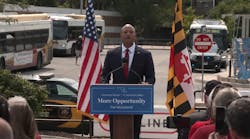Gov. Moore signs workforce development executive order
Maryland Gov. Wes Moore has signed an executive order to promote workforce development in state public works projects.
“We are going to be Maryland strong because we are going to be union strong. This order will promote apprenticeship training programs and local hiring in high unemployment areas,” said Gov. Moore. “We’re going to support our businesses and our workers. We can and must do both. Maryland will be a national model in how we utilize project labor agreements. There is no other state in the nation with an executive order like this one. Maryland doesn’t follow others, we set the pace.”
The order authorizes executive branch units under the control of the governor to consider the requirement for or voluntary use of project labor agreements and community benefits agreements for projects where the state commitment is $20 million or more. The order also authorizes both community hiring provisions for state construction projects that are more than $5 million and executive branch units to require or consider the use of contractors participating in registered apprenticeship programs.
“As a former transportation engineer who oversaw public transportation projects, I know how important our community depends on these projects and their on-time completion,” said Maryland Lieutenant Gov. Aruna Miller “In addition to providing benefits, higher wages and training opportunities for Maryland workers, this executive order will lead to more on-time and on-budget construction projects for the people of Maryland.”
When fully implemented, provisions of Gov. Moore's executive order will:
- Increase family-supporting jobs that will promote financial stability and security for thousands of Marylanders.
- Provide pathways to meaningful employment and careers in skilled trades, particularly among historically socioeconomically disadvantaged groups and communities.
- Provide stability and predictability in labor workforce for state construction projects, thereby preventing labor shortages that result in cost overruns and project delays.
- Ensure, when appropriate, that communities surrounding a major public work project will realize economic benefits from the project
The following conditions must be considered in evaluating the use of project labor agreements:
- The potential for labor disruptions, such as strikes, lockouts or slowdowns, which could affect completion of the job.
- The number of trades and crafts anticipated to be used on the project.
- The need and urgency of the project and the harm to the public if completion of the project is delayed.
- The size and complexity of the project.
- The impact on project costs, if any, and the state’s obligation to encourage maximum practicable competition favoring open competitive bidding during the procurement process.
- The impact on the state’s socioeconomic policies, including the policy to advance women and minority-owned businesses and their ability to compete.
- In addition, the utilization of a project labor agreement must benefit the project and the interests of the public and the state from a cost-effective, efficiency, quality, safety and timeliness standpoint.
“Expanding the pathway to the middle class – that’s at the core of all we do. The Building Trades Unions applaud Gov. Moore for championing project labor agreements. These agreements level the playing field and are really the only viable tool we have to ensure construction is done right,” said Baltimore/DC-Metro Building Trades Unions President Greg Akerman. “For infrastructure investments to truly make a difference, the community these projects are based in must benefit. Local workers’ careers should provide them with family-sustaining wages, robust benefit packages and dignity on the job. Furthermore, all contractors, including women-, veteran- and minority-owned businesses, deserve a chance to bid important work and win. Today was a great day for workers, responsible contractors and MBEs. Our unions look forward to seeing Gov. Moore’s Executive Order on project labor agreements make a difference in Baltimore and beyond.”
The list of project labor agreement candidate projects identified by the Maryland Department of Transportation include:
- MD 4 Bridge Replacement Over MD 717 and Race Track Road
- I-95 Bridge Replacement Over MD 4
- Eastern Bus Division Project
- I-895 Baltimore Harbor Tunnel Enhancement Project
- ALB/I-270 Corridor Project
- Mondawmin Transit Hub Project
- Baltimore Red Line Project
- BWI Concourse C/D Connector & Baggage Handling Project
- Martin State Airport Tower Project



